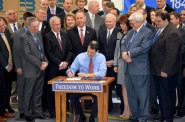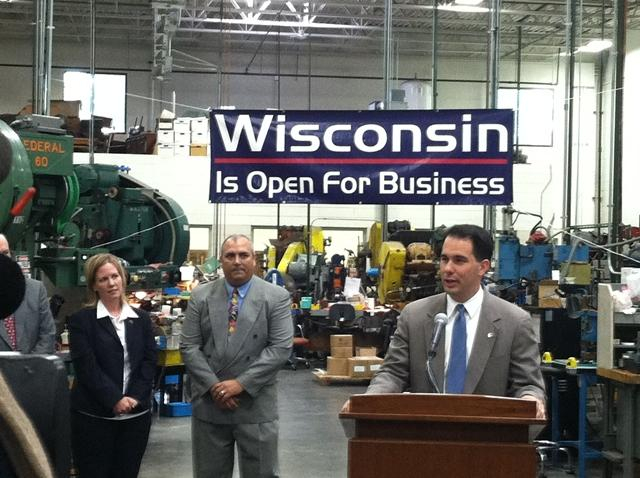Wisconsin’s Economy Still Needs Help
The business climate has improved under Walker but state still lacks a coherent vision of the future.
In terms of the pressing strategic issues of the state, it’s hard to know what to make of the Walker administration and last two GOP-controlled legislatures.
On the big issues — health care costs, university governance and organization, job creation and acceleration of the startup economy, poverty and crime in our major cities, collaboration on the use of our natural resources in tandem with advancements in the economy — all have been given only passing attention by Gov. Walker and GOP legislative leaders.
No doubt, they have improved the business climate, mainly through tort reform, common sense regulations and reductions in tax rates.
But, if you go looking for a game plan over the last four years when the GOP was in complete control in Madison, it would be more on the political side of life in our fair state.
Connect the dots on the big thrusts. Act 10 neutered public unions by taking way bargaining powers and automatic dues collection. Union membership has plummeted. Right-to-work, labeled by Gov. Walker as a distraction in the 2014 campaign, will have an only modest impact on the largely non-union private sector non-union, but will impact unions negatively. The recent push to end costly prevailing union wages in public construction contracts will, if passed, do the same.
Unions, particularly government employee unions, had grown powerful in Wisconsin in alliance with Madison-centric Democratic Party, and a majority of the citizens of the state obviously felt it was time to rebalance the scales of power. Walker and company have accomplished that largely political agenda in spades.
Citizens/voters clearly came to believe that the old adversarial model between unions and management didn’t work in a new era of fierce global competition. Nor does contention over shop rules in high tech workplaces, where innovation and breaking the old rules is the rule.
High level thinking about those high-level challenges has been attempted twice over the last 15 years. The University of Wisconsin led four economic summits from 2000 to 2003, and Competitive Wisconsin Inc. led two statewide exercises on the economy and education in 2010 and 2012.
A few of their recommendations have made headway, but largely without leadership and resources from the state’s political leaders. It came clear in those exercises, for example, that the economy works in clusters, such as papermaking, finance/insurance, information systems, advanced manufacturing, agri-business, business services and health care But clusters as an organizing concept has largely been ignored in Madison.
Leadership has come from elsewhere. To wit: education leaders and two CEOs provided the strategic jolt for the freshwater technology cluster in the M7 Region. They got a little help from the state, and UW – Milwaukee won a new College of Freshwater Sciences. But, because the $150-million cuts to the university system are being done across-the-board, rather than strategically, growth at the new UWM college could be stunted.
Further, GOP leaders have muffed an opportunity to reorganize UW System along regional and cluster lines. They proposed an undefined “authority” as a way to cut costs, but not as a way to align university resources with the state’s prosperity agenda.
A high level commission of citizens could figure out what an authority ought to look like to advance state strategy. It could also have dealt with GOP’s concerns over concepts like tenure and shared governance.
In another display of inertia, out-of-control health costs for state employees and Medicaid recipients, which have been the major spoiler for the state budget, have been ducked. The private sector has tackled health cost hyperinflation; not so for at the state level. Hence, the current budget crisis and the crowding out of other priorities.
The startup economy is revving up in Wisconsin, but mainly through leadership from the private sector. There are new support systems for entrepreneurs; new angel and venture monies are available in the state; accelerators like gener8tor and incubators like Ward4 are priming the pump for investment-worthy deals; and university campuses are encouraging students to think of making a job versus taking a job.
State support in Wisconsin has not been entirely absent. We do have the Act 255 credits that de-risk early stage investments by 25%. But other states, regions and nations have fully embraced the strategy of changing the prosperity game through massive investments in technological and innovative startups. No such vision here. Prosperous Israel, about our size, is known as the Startup Nation.
One of the many surprises in the governor’s budget was to gut the Stewardship Fund and the powers of the Natural Resources Board. The legislature may reverse the latter, but the former has demoralized the conservation community. How strategic is that approach to our natural resources?
Why is little attention paid to the huge challenges to Lake Michigan, to the dead zone in the center of Green Bay? These are invaluable economic assets.
The murder rate is Milwaukee is heading for horrible new highs, but there is virtual silence on pivotal subjects like inner city poverty, joblessness there, unbelievably high birth rates to single mothers — a guaranty of poverty in fatherless households, and the need for funds for more cops on the streets.
Want jobs in the central city? Move some state agencies and UW System headquarters to Milwaukee. Do it ASAP. Madison has jobs going begging. It doesn’t need them like Milwaukee does. Walk the talk.
Wisconsin’s economy has gained ground in the last three years, and some of that lift can be attributed to business leaders feeling a lot better about the positive actions to improve the business climate.
GOP leaders can take a bow on that strategic front. CEO Magazine just ranked the state 12th for business climate, up from 41st four years ago. But middle of the pack on many other rankings isn’t good enough.
It will take a larger vision and executive and legislative action to get to the Top Ten for prosperity among the states.
John Torinus is the chairman of Serigraph Inc. and a former Milwaukee Sentinel business editor who blogs regularly at johntorinus.com.
Torinus
-
How Hillary Could Win GOP Votes
 May 9th, 2016 by John Torinus
May 9th, 2016 by John Torinus
-
Walker Targets Health Care Savings
 Feb 2nd, 2016 by John Torinus
Feb 2nd, 2016 by John Torinus
-
Cheap Surgery on a Tourist Isle
 Jan 12th, 2016 by John Torinus
Jan 12th, 2016 by John Torinus




















CEO Magazine? Does that come with a subscription to Old Rich White Guy Quarterly? Or maybe Yachts & Stuff?
“Walk the talk?” Maybe it’s time for Wisconsin Manufacturers and Commerce’s members to make their moves to invest in the state, after getting everything they asked for. Or do they want even more? If so, tell us.
Wow. For an old rich white guy, John Torinus is sounding more and more like a Democrat.
What little credibility Torinus had was shattered when he cited CEO Magazine for how much the Wisconsin economic picture has improved. this is the same survey of rich angry white establishment types that Scott Walker throws into all of his speeches. The reality of Wisconsin’s economy is considerably different based upon objective measurement. The opinion of the wealthy few who have been benefited in the short term by the trickle down nonsense Walker dogmatically pursues is in stark contrast to the real numbers of Wisconsin’s decline under Walker and his right wing legislature. 40th in private job creation, 5000 dollars below Minnesota in per capita income, with a 2 billion dollar deficit. What about these numbers? The only thing Wisconsin is in the top ten, according to Allied Van Lines,is people moving out of Wisconsin.
A few years ago the Greater Milwaukee Committee put a lot of resources into the cluster model of economic development, but has since dropped it. An article on why and what happened would be interesting, if the participants could be convinced to speak candidly.